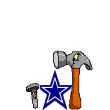Idgit;1740005 said:
Can you get me a link to these unwritten rules of etiquette? I don't need one for every professional team sport with a clock--just one will do. If you can't find a link, any other piece of evidence other than your best guess about what's popular consensus will suffice.
If they're unwritten, then there's no link. I thought you might be able to figure that out. And would other pieces of evidence include every time you watch one of these sports and see a team call off the dogs at the end of blowouts? And how about the evidence that people in these sports complain when teams don't do that? Is that sufficient?
I do all sorts of inappropriate things, and I didn't mean to imply that I didn't. I don't do all of the inappropriate things that occur to me in a fit of sentimentality, though, which was my point.
I'm sure the players in the NFL don't always do what comes into their minds either. Sometimes they do.
The league shouldn't take it. They should maybe take a draft pick away or something. Or maybe their reputation should be tarnished among the NFL fanbase. What they *shouldn't* do is allow people to start illegally targeting their players.
Sanders said it when he said the 15 yards was going to hurt the Pats more than it was going to hurt the Colts. That's the whole point of the debate. A clean hit on Brady is a no-brainer.
So if they hit him legally with an intent to injure, you're okay with that?? Good to know.
You've left off the 'illegal' part of hitting the guy who touches the ball on every offensive play. I'll give you that it's a simple way of looking at it: one play is legal and the other is not. I'm not sure I get why it's naive, though. Perhaps that's my naivette talking, though.
The naive remark was in response to your insistence that unwritten rules don't exist.
There are places on the internet where people spend an awful lot of time talking about Santa and Unicorns, too. I don't have a good answer for you as to why they do it.
First of all, we have players who are either in the league or have been in the past talking about these unwritten rules. Then we have you... someone who has never played in the NFL... saying they don't exist. hmm... who to believe??? I'm so conflicted.
Maybe you can just point me to the section of Running Up the Score in the NFL rulebook and I can back down and won't have to resort to trying to educate the league. That'd be a real time-saver.
Capt. Ross: Corporal Barnes, I hold here the Marine Corps Outline for Recruit Training. You're familiar with this book?
Cpl. Barnes: Yes, sir.
Capt. Ross: You've read it?
Cpl. Barnes: Yes, sir.
Capt. Ross: Good. Would you open it up to the chapter that deals with code reds, please?
Cpl. Barnes: Sir?
Capt. Ross: Just flip open to the page of the book that talks about code reds.
Cpl. Barnes: Well, sir code red is a term that we use, I mean, just down at Gitmo, I really don't think that...
Capt. Ross: Ah, we're in luck then. Standard Operating Procedures, Rifle Security Company, Guantanamo Bay Cuba. Now I assume we'll find the term code red and its definition in that book. Am I right?
Cpl. Barnes: No sir.
Capt. Ross: Coporal Barnes, I'm a Marine. Is there no book. No pamphlet or manual, no regulation or set of written orders or instructions that lets me know that, as a Marine, one of my duties is to perform code reds?
Cpl. Barnes: No sir. No book, sir.
Capt. Ross: No further questions.
[
as Ross walks back to his table Kaffee takes the book out of his hand]
Kaffee: Corporal would you open this book up to the part that says that where the mess hall is.
Cpl. Barnes: Well, Lt Kaffey, that's not in the book either, sir.
Kaffee: You mean to say the entire time you've been at Gitmo you've never had a meal?
Cpl. Barnes: No, sir. Three squares a day, sir.
Kaffee: Well, I don't understand. How did you know where the mess hall was if it wasn't in this book?
Cpl. Barnes: I guess I just followed the crowd at chow time, sir.
Kaffee: Thanks. No more questions.
Actually, my point was that it's not relevant what the other team's intentions are--beyond the fact that their offense intends to score and their defense intends to stop you. I think Belicheck's actions support that, too.
Apparently you have a very narrow definition of relevance.
And I could excuse a whole lot of behavior if I were to look at it as simply as an offense trying to score vs. a defense trying to stop them. I believe that it's more complicated than that.




 It is just talk if Pats blow out the Colts then chances are Sanders is getting toasted and he better worry about his own play.
It is just talk if Pats blow out the Colts then chances are Sanders is getting toasted and he better worry about his own play.